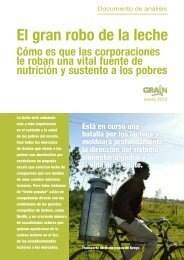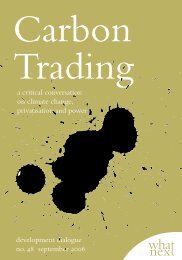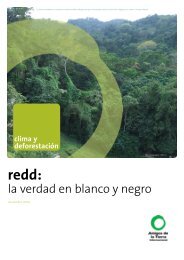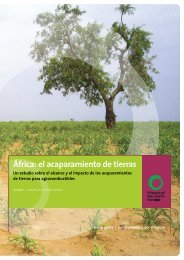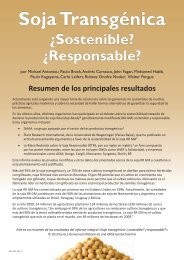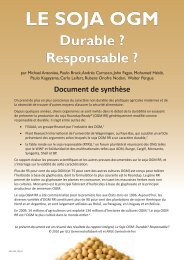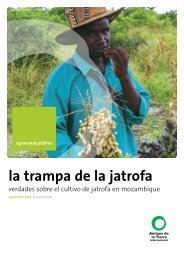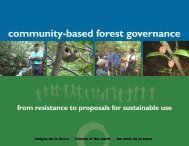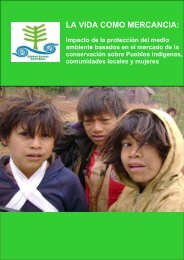Plantations, poverty and power - Critical Information Collective
Plantations, poverty and power - Critical Information Collective
Plantations, poverty and power - Critical Information Collective
You also want an ePaper? Increase the reach of your titles
YUMPU automatically turns print PDFs into web optimized ePapers that Google loves.
124<br />
Director of the Rainforest Foundation, pointed out in an interview with Ethical Consumer magazine,<br />
“The vast majority of what we import into this country [UK] is from North America <strong>and</strong> Sc<strong>and</strong>inavia <strong>and</strong><br />
it’s not timber it’s pulp <strong>and</strong> paper. This shows that most importantly we need to reduce consumption. We<br />
need much, much more recycling <strong>and</strong> reuse. One problem is that the increasing amount of FSC certified<br />
paper <strong>and</strong> toilet tissue is undermining efforts to sell more recycled paper, because people see it <strong>and</strong> think<br />
it’s a green product so it’s OK. Actually it’s not, <strong>and</strong> it may be from oldgrowth logging in Ontario or<br />
Northern Russia, <strong>and</strong> it’s damaging recycling markets.” 620<br />
This criticism is not new. In September 1993, before FSC’s founding assembly, German NGO Rettet den<br />
Regenwald produced a report criticising the proposal to establish FSC. “At best the FSC initiative is<br />
naive,” wrote Rettet den Regenwald, “at worst it provides a framework for the timber industry to achieve<br />
a much desired ‘green veneer’ <strong>and</strong> defuse pressure to attack the real issues of illegal trade, indigenous<br />
people’s rights <strong>and</strong> over-consumption.”621<br />
FSC’s certifying bodies exercise a large degree of control over the way the organisation functions. One of<br />
FSC’s certifying bodies, SGS, is also sponsoring the General Assembly. SGS will be sponsoring the<br />
General Assembly while under a self-imposed “moratorium” on new FSC assessments. On 29 May 2008,<br />
after a series of controversial certificates, SGS imposed the “moratorium”, which FSC misleadingly<br />
announced on its website as a moratorium on issuing new certificates. In fact, SGS continued to issue<br />
certificates, issuing 15 in the three months after announcing the “moratorium”.622 FSC declined to<br />
answer my questions about the “moratorium”.623<br />
Equally disturbing is the relationship between the certifying bodies <strong>and</strong> the companies being assessed.<br />
Companies hire the certifying bodies directly. As such, the certifying bodies compete against each other<br />
for business. Clearly, any commercial timber company is far less likely to hire a certifying body that<br />
interprets FSC’s Principles <strong>and</strong> Criteria strictly <strong>and</strong> gets a reputation for being “difficult” than a certifying<br />
620 “Forest Stewardship Council – Seeing the Wood for the Trees”, Ethical Consumer, Issue 100, January/February<br />
2008. http://www.fsc-watch.org/archives/2008/02/01/FSC_acknowledges_sys<br />
621 “The Forest Stewardship Council Aims Principles <strong>and</strong> Criteria: A <strong>Critical</strong> Examination Predicting its Failure ”, Rettet<br />
den Regenwald, 30 September 1993, cited in Timothy Synnott (2005) “Some notes on the early years of FSC”, 19<br />
November 2005, page 22. http://www.fsc.org/fileadmin/webdata/public/document_center/publications/Notes_on_the_early_years_of_FSC_by_Tim_Synnott.pdf<br />
Of course, parts of the timber industry were also opposed to the establishment of FSC. In 1992, Terence Mallinson, director<br />
of the UK timber industry Forests Forever campaign, wrote twice to the Oxford Forestry Institute stating that FSC “could<br />
rebound on us all” <strong>and</strong> “We do not approve of the FSC <strong>and</strong> its charter, since it is clearly in breach of sovereignty <strong>and</strong> defies<br />
any current or proposed forest management programmes”. Cited in Timothy Synnott (2005) “Some notes on the early<br />
years of FSC”, 19 November 2005, page 37. http://www.fsc.org/fileadmin/webdata/public/document_center/publications/Notes_on_the_early_years_of_FSC_by_Tim_Synnott.pdf<br />
622 According to a search for SGS-issued certificates on http://www.fsc-info.org. When I asked about this, SGS’s Gerrit<br />
Marais told me that "The moratorium came into place on 29th May 2008, however at this point, SGS obviously had already<br />
signed contracts for certification services which have to be concluded <strong>and</strong> it st<strong>and</strong>s to reason that certificates would still be<br />
issued post this date." (Email from Gerrit Marais to Chris Lang “FW: <strong>Information</strong> Request – FSC-Watch”, 3 September<br />
2008.)<br />
623 I wrote to Patricia Dudeck in FSC’s Communications Department on 3 September 2008. FSC’s announcement of the<br />
moratorium stated “For further information, please contact the FSC Communications Program at p.dudeck@fsc.org.” The<br />
contact address has since been changed to communications@fsc.org. “SGS moratorium on new FSC forest management<br />
certificates”, FSC website, 4 July 2008.<br />
http://www.fsc.org/news.html&tx_ttnews[backPid]=86&tx_ttnews[cat]=1&tx_ttnews[tt_news]=31&cHash=467d8d9723



